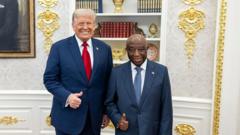President Nayib Bukele of El Salvador is strategically aligning his country with U.S. deportation policies, gaining favor within the Trump administration while offering a robust prison framework for U.S. deportees.
El Salvador's Strategic Alignment with U.S. Deportation Policies

El Salvador's Strategic Alignment with U.S. Deportation Policies
Bukele's Cooperation with Trump Administration Comes with Notable Benefits
In a significant display of cooperation between nations, El Salvador's President Nayib Bukele has formed a mutually beneficial relationship with the Trump administration. As U.S. President Donald Trump pushes for a more stringent approach to immigration and crime, his administration has increasingly sought alliances with countries willing to accept deported migrants alleged to have gang affiliations. El Salvador has stepped up, resulting in notable advantages for both parties.
This collaboration has drawn widespread attention, given that Bukele's agreement to accept more than 200 deportees has led to promises of recognition from the U.S. government. Reports suggest that the Salvadoran president has already received a visit to the White House and has benefited from an improved travel safety assessment for El Salvador, surpassing that of European nations like France.
Experts suggest that the implications of this partnership may resonate far beyond Central America. "Other leaders and countries are trying to emulate the Bukele arrangement," stated Iván Espinoza-Madrigal, a legal director at Lawyers for Civil Rights. He emphasized a growing willingness among nations to develop infrastructure that facilitates the deportation process, which falls in line with a broader trend observed in international immigration policies.
A spokesperson from the White House expressed gratitude for Bukele’s collaboration and the utilization of his nation’s maximum-security prison for housing these deportees. The clearly delineated support for this approach underscores the U.S. administration's commitment to dealing with what it describes as "sick, illegal criminals."
As these geopolitical dynamics unfold, many are left questioning the repercussions for displaced migrants and how this regulatory framework can affect their lives. Critics argue that such arrangements bring to light ethical concerns regarding human rights and justice in the treatment of deportees.
The Bukele-Trump collaboration symbolizes a critical moment as various international entities increasingly reconsider how they approach immigration and their role within a complex landscape of global migration and request for asylum.
This collaboration has drawn widespread attention, given that Bukele's agreement to accept more than 200 deportees has led to promises of recognition from the U.S. government. Reports suggest that the Salvadoran president has already received a visit to the White House and has benefited from an improved travel safety assessment for El Salvador, surpassing that of European nations like France.
Experts suggest that the implications of this partnership may resonate far beyond Central America. "Other leaders and countries are trying to emulate the Bukele arrangement," stated Iván Espinoza-Madrigal, a legal director at Lawyers for Civil Rights. He emphasized a growing willingness among nations to develop infrastructure that facilitates the deportation process, which falls in line with a broader trend observed in international immigration policies.
A spokesperson from the White House expressed gratitude for Bukele’s collaboration and the utilization of his nation’s maximum-security prison for housing these deportees. The clearly delineated support for this approach underscores the U.S. administration's commitment to dealing with what it describes as "sick, illegal criminals."
As these geopolitical dynamics unfold, many are left questioning the repercussions for displaced migrants and how this regulatory framework can affect their lives. Critics argue that such arrangements bring to light ethical concerns regarding human rights and justice in the treatment of deportees.
The Bukele-Trump collaboration symbolizes a critical moment as various international entities increasingly reconsider how they approach immigration and their role within a complex landscape of global migration and request for asylum.




















